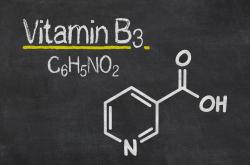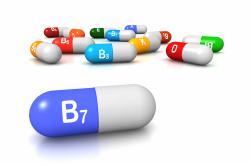Vitamin B6 Deficiency: A Rare But Serious Source for Fatigue
B6 deficiency can be very disruptive to energy levels. Learn the signs and symptoms of low vitamin B6 and how to correctly supplement this important vitamin.
While all vitamins and minerals are necessary for ideal health, there are some that seem more critical than others. These can usually be identified by the negative effects that occur when their levels drop below the minimum required for fulfilling their roles in the body. Vitamin B6 is one such vitamin, and any deficiency can have noticeable impact on your health. This is especially true for those who are already impacted by any sort of fatigue, since this vitamin plays an essential role in the conversion of food to energy.
What is Vitamin B6 and How Does it Benefit You?
Vitamin B6 – also known as pyridoxine – belongs to the B-complex family as well. It is another water-soluble nutrient that works together with its family to support both the nervous system and the adrenals. Its coenzyme properties make it an essential part of the metabolic process when it comes to converting fats, carbohydrates, and proteins into usable form. It also has a critical role in supporting the immune system for older persons.
It should be noted that vitamin B6 is a nutrient that is commonly found in almost all foods. That might make one think it unlikely that the average person could ever experience a deficiency in this vitamin – and that is true to a certain extent. Most people never have a problem absorbing enough pyridoxine to feed their body’s needs. However, there is one factor that can cause some to suffer from a deficiency in this area: the processing of food strips away much of that B6. That leaves anyone with even a mild absorption issue struggling to maintain the proper levels.
This is a problem precisely because of the way that vitamin B6 impacts food conversion into energy. Without the right amount of this nutrient, the metabolic process loses its ability to efficiently process macronutrients into energy. That loss of energy production can invariably lead to muscle weakness, fatigue, and all of the other symptoms of vitamin B6 deficiency.
How Do You Know if You Suffer From Vitamin B6 Deficiency?
Deficiency of this vitamin typically presents symptoms involving damage of the nerves in the feet and hands. Dermatitis, inflammation in the mouth, and cracked lips can also occur. The mind can also be affected, as patients suffer depression and brain fog. Sleep patterns can be disrupted as well, which contributes to increased fatigue.
The telltale signal of a lack of vitamin B6, however, is often found in the peripheral neuropathy that it can cause, as well as anemia, seizures, and an effect similar to pellagra. The effects on the nerves can be quire pronounced in the more severe cases of deficiency, with the hands and feet both suffering damage. The anemic reaction is often confused with low iron levels, and mimics the symptoms associated with that condition.
If you suspect that you might suffer from this deficiency, evaluate your symptoms. Fatigue on its own is seldom indicative of B6 deficiency. If, however, you are suffering nerve pain, inflammation of the tongue (an obvious sign of potential pellagra), anemia, or seizures, consult with your physician immediately. If none of those symptoms are present, chances are that another vitamin, mineral, or medical condition is responsible for your fatigue.
How to Diagnose Vitamin B6 Deficiency
There are three main ways that vitamin B6 deficiency can be diagnosed. They involve tests that measure plasma concentration, urinary excretion, and blood tests. Plasma is widely regarded as the most accurate, since it reflects the actual available B6 currently in the body’s tissues. While urine excretions provide less overall information, they are reliable methods for evaluating the general level of B6 the body is using.
These tests are routinely used in instances where major symptoms have yet to manifest, since those cases are the most likely to go undetected. It should also be pointed out that true B6 deficiency is a rare thing in the absence of other vitamin issues. Typically, this deficiency only presents itself when other vitamins and minerals are out of balance as well.
Food Sources for Vitamin B6
This vitamin can be obtained from several different food types. These include cereal grains, milk, cheese, fish, eggs, carrots, bananas, and spinach. Sunflower seeds and brewer’s yeast can also be great sources for pyridoxine. In addition, foods like chicken, and soybeans can also provide the B6 you need.
How to Supplement Vitamin B6
When supplementation is necessary, 1.3 mg is usually the recommended daily allowance for adults, with people over the age of 50 needing as much as 1.7 mg. This is another vitamin best taken as part of the B-complex multivitamin. Infants require so little that it is safer to avoid supplementation. Children can generally maintain health with between .3 and 1.2, depending on their age. Pediatricians should be consulted prior to giving children any supplements, of course.
Potential Side Effects and Interactions
No one should take more than 100 mg daily, from food and supplements combined. Anything higher can result in numbness or nerve damage that can be permanent in nature. High doses of B6 can also make you more vulnerable to direct sunlight, and lead to symptoms like vomiting, nausea, rashes, stomach pain, and loss of appetite.
Note that B6 supplements interact poorly with medications used in the treatment of things like Wilson’s or Parkinson’s disease. Those medications include both penicillamine and levodopa. Birth control pills and other estrogen products can also produce negative reactions when coupled with this vitamin. It is also vital to understand that any attempt to increase the levels of this vitamin should first focus on dietary changes, since those are the least likely to cause any sort of side effects.
Though it is a rare phenomenon, B6 deficiency remains an important consideration for anyone who suffers from any level of fatigue. Because it can present itself in cases where someone is using oral contraceptives or suffers from conditions such as liver disease or HIV, it remains a concern worthy of increased vigilance. For patients who are aware of the symptoms, however, early detection and treatment almost always resolves the deficiency.
You might also be interested in:
- Vitamin B6. http://www.merckmanuals.com/professional/nutritional-disorders/vitamin-deficiency-dependency-and-toxicity/vitamin-b-sub-6-sub
- Vitamin B6. http://www.medicinenet.com/vitamins_and_calcium_supplements/page9.htm#vitamin_b6
- Vitamin B6 (Pyridoxine). http://www.vitamin-mineral-info.com/vitamin-b6-pyridoxine.php
- What is vitamin B6? What is pyridoxine? http://www.medicalnewstoday.com/articles/219662.php
- Vitamin B6 (Pyridoxine). http://www.mayoclinic.org/drugs-supplements/vitamin-b6/background/hrb-20058788



















Leave a comment